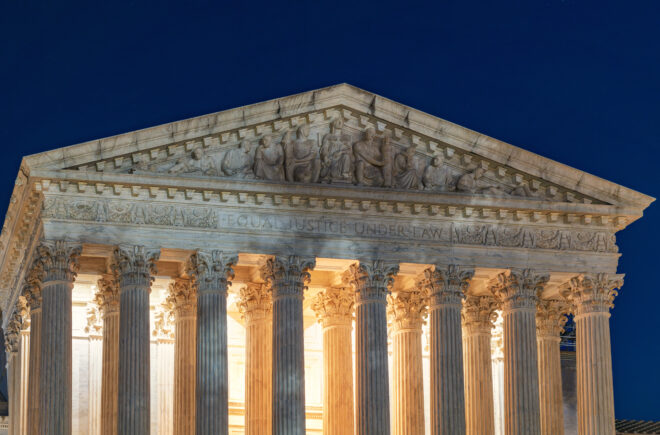
The Supreme Court has upheld a Tennessee law banning many medical treatments used to treat gender dysphoria in minors.
The 6-3 decision in United States v. Skrmettiauthored by Chief Justice John Roberts and released on June 18, 2025, is a disaster for trans youth and their families in Tennessee. There’s no softening that impact. Tennessee’s SB1, the state law at issue in Scrmmetbans anyone under 18 with gender dysphoria or other conditions related to the “discordance” between a “minor’s sex and asserted identity” from receiving many medical interventions, including hormone therapy and puberty blockers.
Importantly, SB1 does allow medical professionals to administer these same treatments for other conditions like precocious puberty, congenital defect, disease, or physical injury. In other words, Tennessee’s law allows cisgender children to access gender-affirming care, but not transgender kids. And it does so explicitly: The text of the law declares that the purpose of SB1 is to “encourage minors to appreciate their sex.”
That should have made Scrmmet an easy case for this Court to decide. Laws that regulate on the basis of sex are subject to a heightened constitutional standard. This means that they must further an “important government interest,” according to constitutional lawand that the regulation must be “substantially related to that interest.” The attorneys challenging SB1 had argued this was a regulation on the basis of sex. The Court’s conservative majority disagreed.
Chief Justice John Roberts decided that this standard didn’t apply in Scrmmet. In a logic-defying 24-page opinionhe wrote that Tennessee’s law does not target transgender youth based on sex, but rather targets age and medical use for regulation. Defined that way, Roberts said, the law is subject to the lowest possible constitutional standard of judicial review, called rational review. Rational review is the most deferential to government action; it only requires that the state show that the regulation is “‘rationally related to a legitimate governmental interest.’”
Here’s how Roberts justified his interpretation of the SB1 in Scrmmet: Tennessee’s gender-affirming care ban classifies people based on whether they have conditions like “gender dysphoria, gender identity disorder, or gender incongruence”—not based on their “transgender status.” Of course, those are conditions almost exclusively experienced by transgender people, but nevermind that.
“[R]oberts might as well have argued that Jim Crow laws do not discriminate on the basis of race, but instead discriminate based on the color of a person’s skin,” wrote columnist Ian Millhiser over at Vox in his excellent summary of Scrmmet.
The silver lining in Scrmmet is that the majority decision did not address whether trans folks are part of a protected class. Federal law prohibits discrimination on the basis of race, color, sex, national origin, disability, and age. Had the Court explicitly excluded trans people from that list, it would have given the green light to conservative lawmakers to start passing nearly any kind of anti-trans legislation, from bans on hormone therapies for adults to restrictions on surgical procedures.
But that could still happen. Enter Justice Amy Coney Barrett.
Barrett had been frustrating conservatives recently by her refusal to rule lock-step for the Trump administration. Yet her concurring opinion in Scrmmetwhich Justice Clarence Thomas joined should put to rest any false notion that she’s some sort of moderate jurist. In it, she deviously lays the groundwork for a future ruling that trans folks can never be considered a protected class under the Constitution.
Her concurring opinion contends that the category of transgender people is “‘large, diverse, and amorphous’” because it can contain a “‘huge variety of gender identities and expressions.’” Therefore, the opinion concludes, it is basically impossible to discriminate against transgender people as a group. Barrett and her conservative colleagues explain away the pervasive—and yes long—history of anti-trans discrimination in this country, which includes cross–dressing bans, drag bans, bathroom bans, and more.
Justice Samuel Alito filed his own concurrence arguing on different grounds that trans folks should not be constitutionally protected as a protected or quasi-protected class. But don’t mistake that difference as a disagreement between Alito and Barrett. It’s not. In my assessment, neither believe the Constitution protects trans folks.
Roberts’ opinion frames Scrmmet as a narrow decision, in part because it doesn’t address this larger question of whether or not transgender people are a protected or semi-protected class. Some legal journalists, like Joan Biskupic of CNN, agree that the decision was narrow.
But here’s the thing: A narrow opinion doesn’t end the fight over trans rights—not in statehouses across the country, and not at the Supreme Court. And in any case, this opinion is not as narrow as Roberts and others portray it.
Thanks in large part to Roberts’ own insistence that Tennessee’s law regulates medical procedures rather than transgender youth, and thanks to Barrett’s roadmap for denying trans folks any constitutional protections from laws that target them, the Scrmmet decision is very likely to have widespread fallout. Conservative states across the U.S. now have permission from the highest court in the land to further crack down on health care for trans Americans. Texas, for example, attempted to pass a gender-affirming care ban for adults as well as minors. Other states havetoo.
And I can all but guarantee you that litigators at conservative litigation firms like the Alliance Defending Freedom and Becket Fund will be working to ensure that the Supreme Court soon takes up the question of what—if any—constitutional protections trans folks have.
They know that at least three of the Court’s conservative justices are willing to assert that trans Americans have no particular rights. As I wrote when the Court first took the Dobbs caseit takes four justices to decide to hear a case, and it takes five to decide to change a law. Roberts avoided the big fight over trans rights for now in Scrmmet. I’m certain his conservative colleagues on the bench won’t let him avoid the next one.



